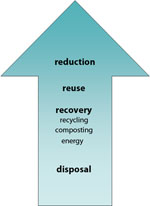2.6.1 Principles of pollution prevention
There are a number of principles of pollution prevention; we will briefly discuss some of them.
Principle of waste optimisation: The motto in this principle is ‘Do not produce any waste; if this is not possible, reduce or minimise waste generation as much as possible’.

There are three ‘Rs’ that are applied in waste optimisation: Reduce, Reuse and Recover. Figure 2.6 shows the hierarchy or the order in which the waste optimisation options should be used. Reduction refers to changing the process so that waste is not produced in the first place. Reuse involves using an item more than once (for example you can reuse plastic bottles for collecting water). Recovery involves recovery of materials or energy through recycling, composting and incineration. An example of recycling is taking used aluminium cans (tin cans) and recycle the metal to make it into something else. In composting we can take waste organic matter and make it into useful compost for fertiliser. Through incineration (burning) we can recover the energy contained in waste materials. There is more information on these processes in Study Session 22 on solid waste management.
The concept of waste optimisation is applied in industries through cleaner production. Cleaner production implies appropriate environmental management, waste minimisation, replacement of toxic chemicals, process and product modification, and the application of the three ‘Rs’.
Polluter pays principle: This principle identifies the people or organisations who generate or produce waste or pollution as those who are accountable for any human or ecological damage. They are responsible for paying the costs of any damage. The principle is an economic tool to enforce accountability and responsibility. Strict standards for pollutant discharge permissions and enforcing heavy taxation on products or waste handling are ways of making the polluter pay.
Principle of ‘Cradle to Grave’: This principle applies to the production of any object or to any activity by an individual or institution and all the pollution that object or activity might cause throughout its lifecycle; that is, from its ‘cradle’ to its ‘grave’. For example, if you make a plastic bottle, pollution might be caused in the manufacturing process; pollution is also caused by the lorries that transport the bottles around the country; and pollution is caused when the bottle is thrown away. All these aspects should be taken into account.
Precautionary principle: For any activity, there is an obligation not to cause harm even when someone is uncertain about the effect of the activity on humans and the environment. Under this principle, you take precautions to avoid environmental damage, even if you are not certain that damage will result. The application of waste minimisation is an example.
Principle of duty of care: Any person or organisation that produces waste, i.e. a waste generator, has a citizenship and ethical obligation to handle their waste properly. They have a duty to ensure that it does not harm other people or the environment.
Principle of discharge/emission permit: A waste generator has an obligation to obtain permission from the regulatory authority in order to discharge waste to surface water and to the atmosphere.
Principle of sustainable development:
What do you remember about the term ‘sustainable development’?
Sustainable development is ‘development which meets the needs of the present without compromising the ability of future generations to meet their own needs’. You could think of this as friendly coexistence where people and the environment sustain each other.
Sustainable development requires people to carry out environmental mitigation (lessening the damaging effects) for newly developed factories, dams, irrigation schemes and other undertakings as prescribed by law.
Principle of the right to know: The public has the right to information about pollution from a particular process. Public participation at various stages of project development avoids mistrust and the consequences of conflicts of interest.
2.6 Principles of pollution management
